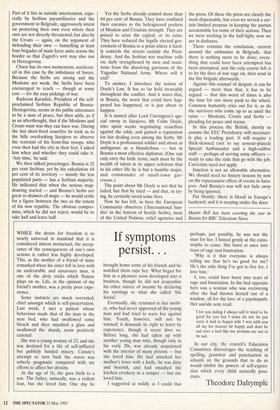If symptoms
persist.. .
WHILE the desire for freedom is so nearly universal in mankind that it is considered almost instinctual, the accep- tance of the consequences of one's own actions is. rather less highly developed. This, as the mother of a friend of mine remarked when his sister fell in love with an undesirable and unsavoury man, is one of the dirty tricks which Nature plays on us. Life, in the opinion of my friend's mother, was a pretty poor expe- rience.
Some instincts are much overrated, chief amongst which is self-preservation. Last week, I met a patient whose behaviour made that of the man in the next bed, who had swallowed some bleach and then smashed a glass and swallowed the shards, seem positively rational.
She was a young woman of 23, and she was destined for a life of self-inflicted but publicly funded misery. Canute's attempt to turn back the waves was soberly pragmatic compared with my efforts to affect her destiny.
At the age of 16, she gave birth to a son. The father, naturally, was a violent lout, but she loved him. One day he brought home some of his friends and he watched them rape her. What began for him as a pleasure soon developed into a business, though he did not jeopardise his other source of income by declaring his earnings to what she called 'the Social'.
Eventually, she returned to her moth- er, who had never approved of the young man and had tried to warn her against him. Youth, however, will not be warned; it demands its right to learn by experience, though it never does so. Before long, she had taken up with another young man who, though only in his early 20s, was already acquainted with the interior of many prisons — but she loved him. He had attacked her mother's lover with a knife, he was dirty and boorish, and had smashed the kitchen crockery in a temper — but she loved him.
I suggested as mildly as I could that perhaps, just possibly, he was not the man for her. I hinted gently at the catas- trophe to come. She burst at once into tears of rage and frustration.
`Why is it that everyone is always telling me that he's no good for me? He's the only thing I've got to live for. I love him.'
I, too, could have burst into tears of rage and frustration. In the bed opposite hers was a woman who was recovering after she had thrown herself out of a window, all for the love of a psychopath. Her suicide note read:
I lov you daling 1 always will iv tried to be good for you but I nowe im not im just sorry it had to hapen wile I was with you all my lov forever be happy and dont be sad over a fool like me promiss me not to be sad.
In our city, the council's Education Committee discourages the teaching of spelling, grammar and punctuation in schools on the grounds that to do so would inhibit the powers of self-expres- sion which every child naturally poss- esses.
Theodore Dalrymple


































































 Previous page
Previous page